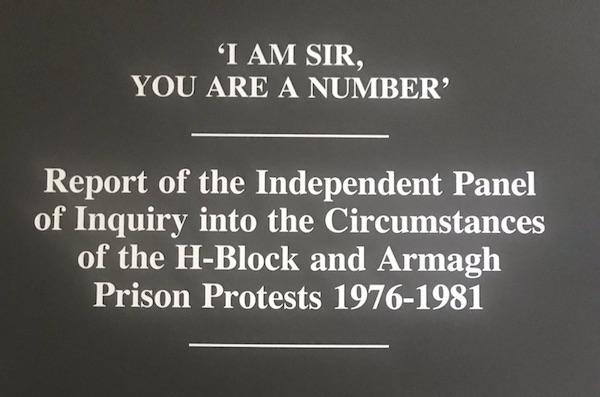
An independent inquiry report into the mistreatment of PoWs in the H-Blocks and Armagh Women’s Jail in the period between 1976 and 1981 has exposed the systematic abuse and torture of prisoners during the prison protests.
Commissioned five years ago by ex-prisoners’ group, Coiste na n-Iarchimí, the inquiry took statements from around 90 protesting prisoners.
As well as testimonies from republican PoWs, the panel heard evidence from former loyalist prisoners and former prison governors. Ex-PoW Séanna Walsh, who helped launch the inquiry, said there were many former prisoners who were still enduring the impact of that period.
“They were still suffering and there were a number of them, as far as I was concerned, who were dying prematurely. Since the collection of the prisoners’ statements in 2015 five people who contributed have now passed. We decided that it was very important to capture the story.”
In appointing an independent panel of legal and medical experts, Mr Walsh said the inquiry had been put beyond a place where people could talk about it as propaganda.
There was overwhelming evidence of torture, inhuman and degrading treatment directed at republican prisoners by prison staff throughout the period under review, the report found.
As well as the findings relating to the conditions in the prisons, the report confirmed that the systematic abuse of PoWs was sanctioned at the highest level.
“The frequency and severity of these abuses established a systemic pattern of deliberate intent and could only have persisted with the knowledge and approval of governors,” it stated.
“Former prisoners are unanimous in stating that they seek neither revenge nor compensation but remain committed to establishing the truth of what happened throughout their incarceration”.
The panel found a large number of prisoners suffered from long term illnesses from their time in prison, and some died prematurely of cancer related illnesses. Respiratory disorders, attributed to exposure to toxic chemicals used to clean the prison landings during the blanket and no wash protests, were common.
“Prisoners’ exposure to chemical toxins remains a serious concern as there is evidence of prolonged illnesses, including cancer; this issue requires further investigation”, the panel found.
One of the female prisoners who gave evidence had been pregnant when she was sent to the Armagh prison. She described being taken from the prison an outside hospital where she remained handcuffed to a bed in the operating theatre while undergoing a caesarian section.
She reported having been punched in the stomach by a guard who taunted her that she would not survive. After the birth, her baby was taken from her for a week with any explanation. “He (prison doctor) never examined nor treated me whatsoever after [her baby] was born”, she said.
Among those to give evidence was a former prison governor who said in testimony that they had been faced with “an abnormal situation”.
“None of us liked it. None of us understood it. None of us believed it would do what it was meant to do, which was turn people away from any campaign,” he said.
Given the findings, Mr Walsh said that while the main focus of the inquiry participants was to “get the truth out”, he said some now believe that somebody has to be held accountable for what happened.
“I have no doubt that some people will be traumatised by it, but I think that it helps vindicate their stance,” he said.
“I can’t find the right words to describe the whole criminalisation policy and the thinking behind it, but it shows how malevolent it was and how vicious the implementation of it was.
“Hopefully this can help vindicate some of the ex-prisoners and can bring some sense of recognition of what people endured.”
Both Sinn Féin and the Irish Republican Socialist Party welcomed the report.
“Our thoughts are with those affected and their families who are still with us, and also those that are not with us. The men and women of the H-Blocks and Armagh will never be forgotten,” the IRSP said. Over 100 INLA PoWs were directly affected and involved in the anti-H block campaign from 1976-81.
Sinn Féin’s Gerry Kelly described the report as “ground-breaking”. He said the “brutal” treatment of prisoners had had a detrimental impact on their long term physical and psychological state, as well as negatively impacting on their family life.
The report was the first of its kind to explore the “barbarism” which was deeply embedded in the prison regime, he said. “It shines a light through the dark webs of mistruths that the British establishment peddles about the treatment of republican prisoners during the conflict.”
![[Irish Republican News]](https://republican-news.org/graphics/title_gifs/rn.gif)
![[Irish Republican News]](https://republican-news.org/graphics/title_gifs/harp.gif)

